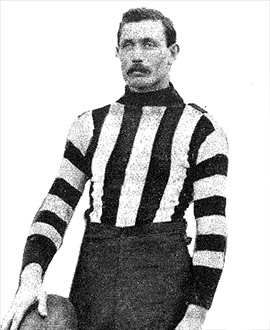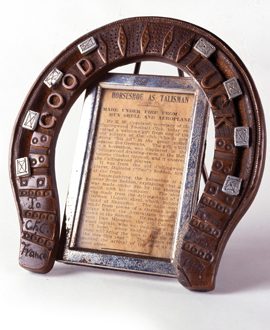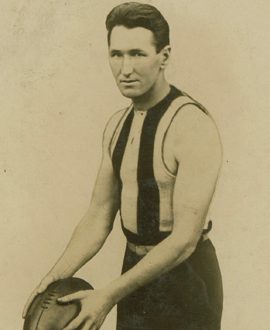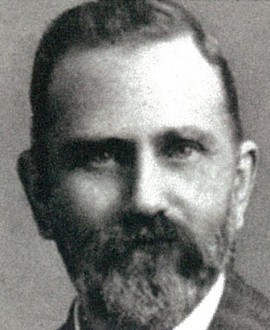Collingwood never got to see the best of Jim Sharp as a player – but that didn't stop him making a massive contribution to the club during nearly 15 years of service that saw him spend more than a decade as President.
But that administrative acumen wasn't why Collingwood recruited him in the first place. Instead, it was as an experienced, elite player who the Pies felt could help boost an already strong Premiership side.
James Sharp had started his career with Fitzroy in 1901, having been recruited from a local club called Fitzroy Crescent. He was a fine mark and glorious drop kick who started as a forward but developed into one of the League's champion defenders.
He was a brisk moving centre half-back who was best afield in Fitzroy’s 1904 flag win (that was a happier experience than the previous year, when the Roys had lost to Collingwood and Sharp collapsed from exhaustion, sunstroke and heat apoplexy and did not regain consciousness until 9.30 that night).
He read the play beautifully, had a nice pair of hands and was a superb kick. He was regularly rated among the top three defenders in the League and in 1905 "stood alone as the champion half-back of the season", according to Sport newspaper.
Sharp represented Victoria in three successive years from 1902, was the club's best and fairest in 1904 and its captain from 1908-10. He retired as a player midway through 1910, amidst some internal dissension, after 162 games and 45 goals.
But Collingwood talked him into playing again and he made his debut for the Magpies in the sixth round of the 1911 season, against Melbourne. By this time he was 29 and, though his best football was undoubtedly behind him, he immediately made a huge impact. So impressive were the 14 games he played that year that he was chosen for Victoria in the 1911 carnival and – even more importantly – the players elected him as their captain for the 1912 season.
However, this is where Jim Sharp's finest qualities stood out. One of the most universally liked and respected men in football turned down the offer of the captaincy, saying he felt Jock McHale had done more to deserve the honor. Dick Lee in turn stood down from the vice-captaincy in order to hand that to Sharp.
But only three games into the 1912 season, Jim Sharp's playing career all but ended anyway, an accidental collision with a St Kilda player having damaged his leg so badly that one of his shinbones was broken almost half-way through. The sad irony was that that he'd missed only six games in his first nine years at Fitzroy, yet had lasted only 17 games into his career in black and white.
Sharp was so admired that there was a universal outpouring of sadness at the injury. "He is the type of footballer that can ill be spared," wrote the Football Record. "He is fair and dashing, full of ability, with a due sense of the responsibilities of a footballer." "It is men like Jim Sharp who bring honour to the pastime," said the Football Follower. "He was respected by friend and foe and, besides being an absolute champion, was a manly and honest opponent."
While Sharp's career seemed to be over, his service to Collingwood was not. The very next year he began a long stint as club President, a role in which he excelled. And as things turned out, his playing career wasn't quite over just yet.
In 1917, the Pies were one man short in a match at Geelong after 'Lofty' Hughes missed the train, and Sharp agreed to fill in. At age 35, and not having played for five years, there were understandable concerns about his ability to last the game. But those concerns were rendered irrelevant when he injured the cartilage in his knee in the first few minutes and had to be carried off. This time it really was the end.
Still, he'd claimed the unlikely honour of being the only club president to play a game while in office. But as everyone at Victoria Park knew, his legacy to the club, and to the game, would end up being far greater than an historical curiosity. And it grew even greater nearly 100 years later when his grandson, Paul Seedsman, pulled on a back and white jumper too.
- Michael Roberts





